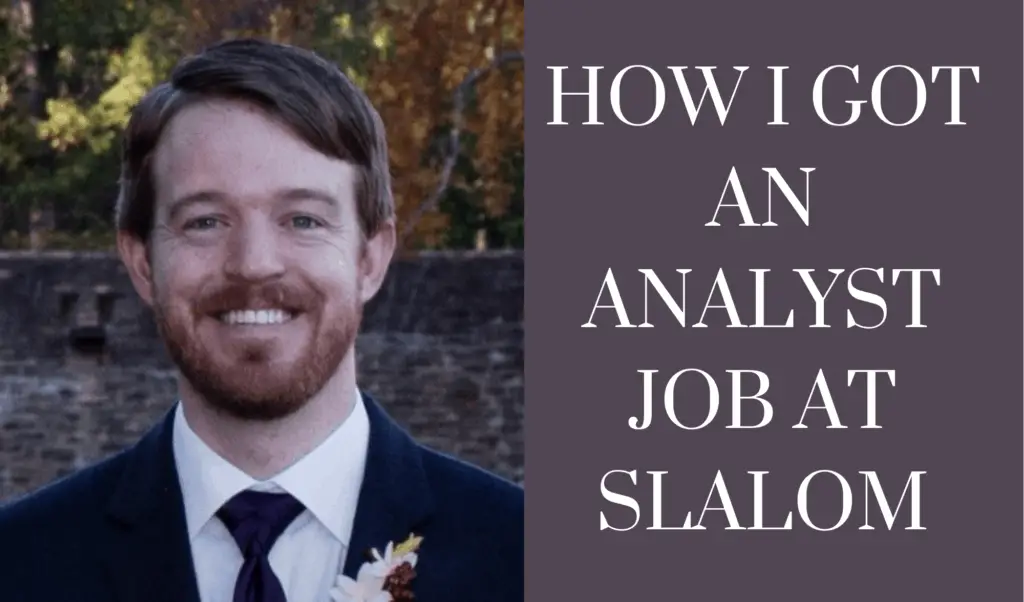Here is an interview with insights and interview tips from Peter Griffin, doing an analyst job at Slalom
What was your first job or nuggets from jobs you had that helped you get to where you are today?
My first job out of college was during the great recession. Even though I though I was interested in an economics/analytics roll, after six months of searching, I gladly accepted my first and only offer which was a healthcare programmer/analyst roll. This ended up being a blessing in disguise as I discovered that I actually loved programming. I loved that it enabled me to solve someone’s problem or make their life easier in a way that could be copied and adapted to other problems, but also tailored specifically to the individual’s needs. That part of programming was never apparent in my college classes and would have been completely missed had I not been forced to use programming extensively in my analyst job at Slalom. The nugget from that experience is that testing out new things, different rolls, and different industries is key to discovering what truly drives you and makes you happy. Get experience with different work environments, rolls, and tools anyway you can.
Why did you choose a career in this field?
The tech startup industry in particular benefits from a broad base of knowledge. Even if you are a technical specialist, you will be called upon to inform product decisions. Because there will be countless opportunities to improve the product and create wins for the company, the ability to field skills outside your typical domain can enable you to seize opportunities as they appear. This wasn’t a reason I initially sought a career in this industry, but it should have been. A big reason I sought to use programming in an analytical position is that I like applying objective knowledge, tools, and techniques to solve people’s problems. In hindsight, I’ve realized that many fields of engineering also scratch that same itch, but that just reemphasizes my earlier point of try as many things as possible.
Can you provide some book recommendations?
One book who’s importance in the job search I can’t understate, is “The 2-Hour Job Search” by Steve Dalton. It sounds cheesy, but it genuinely had solid advice for how to prioritize your outreach efforts and avoid the black hole of despair that is internet job postings.
Things are changing very fast in the industry; how do you keep yourself updated. Please list techniques or newsletter, podcasts, events etc.
If you’re interested in economics, I highly recommend both the “Planet Money” and “The Indicator” podcasts.
If you’re interested in keeping abreast of data science techniques, “Linear Digressions” is a good high-level listen.
You won’t have time for everything, so, unless you’re a politician who’s career depends on never being caught unaware, cut the news from your media diet. My experience has been that anything truly news worthy will invariably trickle though from friends, family, and strangers.
Advice for someone looking for an analyst job?
Actually go follow up in person. It shouldn’t work, but I’ve found that 30%-50% of the time just going to follow up in person get’s your application out of the online black hole and in front of someone who can actually get the ball rolling. Some of the bigger companies have front desk people specifically instructed to turn people without an appointment away, but it’s always worth trying, I’m constantly shocked at how effective this can be, especially at smaller companies. Two examples I’ve used are: Say you’d applied online, hadn’t heard anything back and were wondering who is would be best to follow up with. Alternatively, say you’d applied online, but the description was vague and you were hoping there might be someone who could discuss the opening in more detail. Whatever approach you take, the key is to start a process of followups that gets your resume in front of the right person. Sometimes that means offering a copy of your resume or contact information, sometimes it means sending a thank you e-mail and/or a followup question to someone who’s contact information you were given. If nothing else, this process helps break the monotony of online applications.
Why do you think you were selected among other candidates?
I’m told I was one of the few candidates that satisfied both the head of marketing’s desire for creative storytelling and cultural fit as well as the head of analytics desire for technical data analytical skill including the ability to use SQL.
Lessons from jobs that you couldn’t get.
During my most recent round of job searching, there were two jobs I didn’t get that taught me something. The first was a analyst position at University of California Office of the President (UCOP). I was a good fit for the requested skills and got through all the rounds of interviews and I thought they went quite well so I was a little shocked to learn that I wasn’t going to get the position. It turns out they’d just happened to get another applicant who was an even better match. Sometimes you’re just unlucky.
Another application that taught me something was on a technical phone screen for a position at Lyft. When I was asked what projects I thought were most impactful, I made the mistake of answering with examples of visualizations that helped decision makers at my previous company since nothing changed without their say-so. As it turned out he was looking for an answer more inline with the question “what is the most technically challenging project you have completed?”. Interviews aren’t perfect, sometimes they don’t ask the questions they really want to know the answer to.
Peter Griffin works as analyst at Slalom


